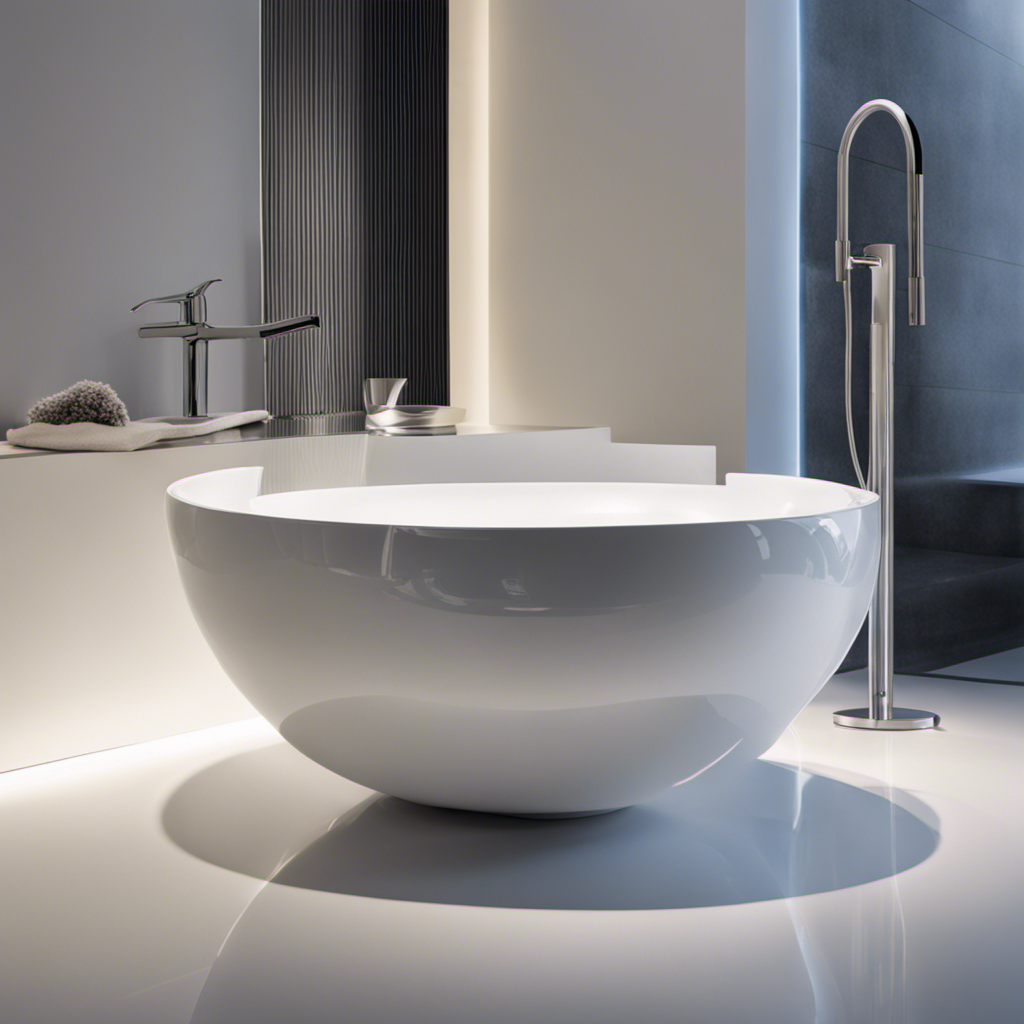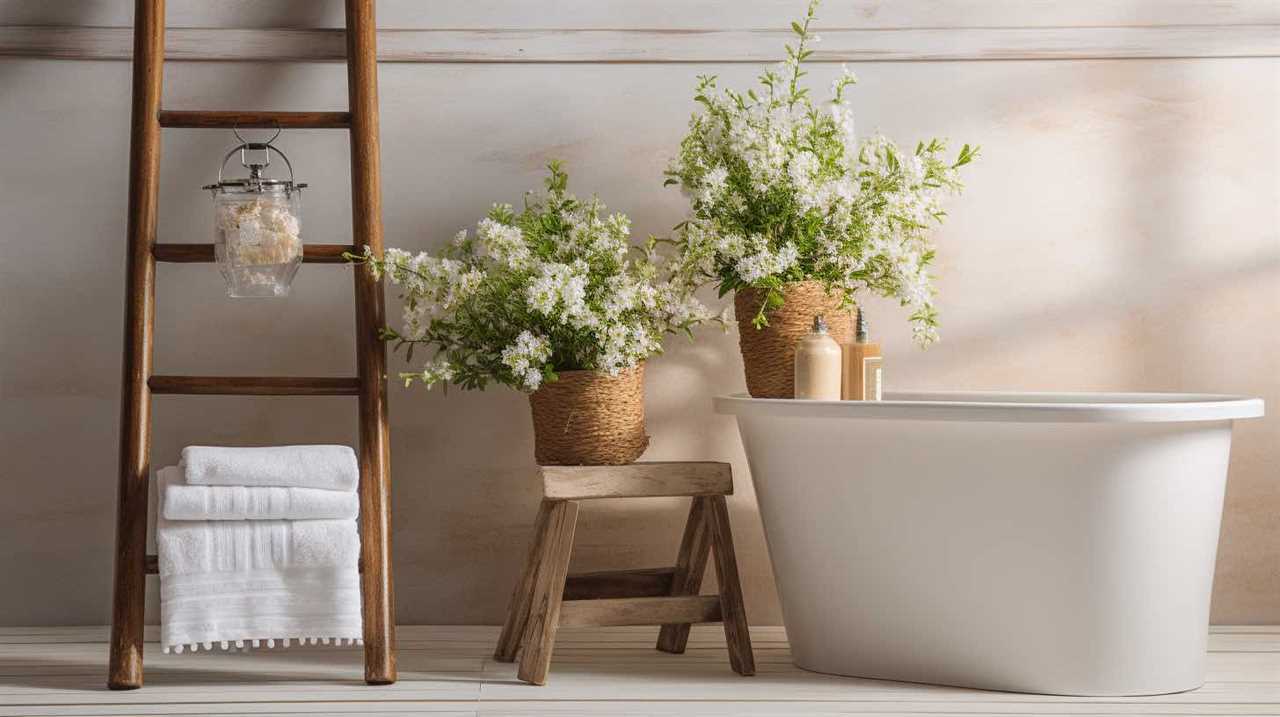Are hard water stains in your toilet giving you a headache? Look no further for effective solutions to banish those unsightly marks.
With the power of natural ingredients like white vinegar, vinegar and baking soda, and borax, you can restore the cleanliness of your toilet in no time. Imagine a sparkling, stain-free bowl that shines like new.
In this article, we will explore the causes of hard water stains and provide you with step-by-step instructions on how to remove them. Say goodbye to stubborn stains and hello to a pristine toilet.
Key Takeaways
- Regular tap water has low mineral content, while hard water contains higher levels of minerals like calcium and magnesium.
- Hard water stains in the toilet can also include rust and scale stains.
- Stains accumulate gradually and require regular cleaning.
- Effective solutions for removing hard water stains include white vinegar, vinegar and baking soda, borax, and pumice stones.
Understanding the Causes of Hard Water Stains
Regular tap water contains few minerals, but hard water, which has higher levels of minerals like calcium and magnesium, is the cause of those stubborn stains in the toilet.
Many people have common misconceptions about hard water stains, believing that they are caused by poor cleaning habits or dirty toilets. However, the truth is that hard water stains are a result of the minerals in the water reacting with oxygen and other substances in the toilet bowl.
To prevent future hard water stains, it is important to regularly clean and maintain the toilet using effective cleaning solutions. Contrary to popular belief, using harsh chemicals or abrasive scrubbing tools may actually worsen the stains or damage the toilet.
Instead, using natural remedies such as white vinegar, baking soda, and borax can effectively remove hard water stains without causing any harm.
The Power of White Vinegar: A Natural Cleaning Solution
Using white vinegar as a natural cleaning solution can effectively remove mineral stains from the toilet bowl. Not only is vinegar a powerful cleaner for hard water stains, but it also has numerous other cleaning uses.
Vinegar is a versatile and eco-friendly option that can be used to clean windows, countertops, and even remove odors from fabrics. One of the main benefits of using vinegar as a cleaning solution is that it is non-toxic and safe for the environment. Unlike harsh chemical cleaners, vinegar does not leave behind harmful residues or fumes.
Additionally, vinegar is cost-effective, readily available, and easy to use. By incorporating vinegar into your cleaning routine, you can achieve a sparkling clean toilet bowl and a safer, more sustainable home.
Harnessing the Cleaning Power of Vinegar and Baking Soda
To harness the cleaning power of vinegar and baking soda, one can combine the two ingredients to create a highly effective cleaning solution. However, another alternative cleaning agent that can be used is lemon juice.
Lemon juice contains citric acid, which is known for its ability to remove hard water stains. Citric acid works by breaking down the mineral deposits that cause these stains, making them easier to remove.
When using lemon juice, one can follow similar steps as with vinegar and baking soda. Simply apply lemon juice to the stained areas, let it sit for a few minutes, and then scrub with a brush. The citric acid in the lemon juice will help dissolve the hard water stains, leaving your toilet clean and sparkling.
Tackling Tough Stains With Borax: a Tried and True Method
Borax is a tried and true method for tackling tough stains in the toilet. When it comes to removing mineral stains, using borax as a toilet cleaner has its benefits and drawbacks.
One of the benefits is that borax is a natural and non-toxic cleaner, making it safe for use in the bathroom. It is also effective in removing stubborn stains caused by hard water and mineral deposits.
However, compared to vinegar, borax may not be as effective in breaking down and dissolving the minerals. Vinegar has a higher acidity level, which helps in loosening and removing stains. Therefore, if you have particularly tough stains, vinegar might be a better option.
Nonetheless, for general cleaning and maintenance, using borax as a toilet cleaner can still yield satisfactory results.
Scrub Away Hard Water Deposits With Pumice Stones
Pumice stones provide an alternative method for scrubbing away stubborn hard water deposits in the toilet. When used correctly, pumice stones can effectively remove mineral stains without causing damage to the toilet surface.
To use a pumice stone, wet it thoroughly and gently rub it back and forth over the hard water deposits. It’s important to apply light pressure and avoid scrubbing too vigorously to prevent scratching the porcelain. Make sure to keep the stone and the toilet surface wet throughout the process to minimize any potential damage.
After scrubbing, flush the toilet to remove any residue. Remember to always read the manufacturer’s instructions and test the pumice stone in an inconspicuous area before using it on the entire toilet bowl.
Using pumice stones effectively without damaging the toilet can restore the cleanliness and shine to your toilet bowl.
Frequently Asked Questions
How Do Hard Water Stains in the Toilet Affect the Overall Cleanliness of the Bathroom?
Hard water stains in the toilet can negatively impact bathroom hygiene. These stains can accumulate over time, making it necessary to regularly clean the toilet to maintain cleanliness and prevent the buildup of mineral deposits.
Are Hard Water Stains Harmful to Health?
Hard water stains in the toilet are not harmful to health, but they can have negative effects on plumbing and fixtures. The mineral deposits can clog pipes and cause damage over time, requiring regular cleaning and maintenance.
Can Hard Water Stains Be Prevented in the First Place?
Preventing hard water stains in the first place can be achieved by regularly cleaning the toilet and using water softeners. Long term effects of hard water stains include damage to fixtures and appliances.
What Are Some Other Household Uses for White Vinegar Besides Cleaning Hard Water Stains in the Toilet?
White vinegar has multiple household uses besides cleaning hard water stains in the toilet. It can be used as a natural disinfectant, deodorizer, and fabric softener. Its acidic nature makes it an effective cleaning agent for various surfaces.
Are There Any Commercial Products Available Specifically Designed to Remove Hard Water Stains in the Toilet?
Yes, there are commercial products available specifically designed to remove hard water stains in the toilet. However, household remedies like vinegar, baking soda, and borax can also be effective and more affordable alternatives.
Conclusion
In conclusion, hard water stains in toilets can be a persistent problem, but there are effective solutions available.
Using natural cleaning agents like white vinegar, vinegar and baking soda, or borax can help remove these stubborn stains and restore the cleanliness of your toilet.
Did you know that according to a study conducted by the Water Quality Association, nearly 85% of homes in the United States have hard water? This statistic highlights the widespread nature of the issue and the need for effective solutions.
By implementing these cleaning methods, you can banish hard water stains and keep your toilet looking pristine.










